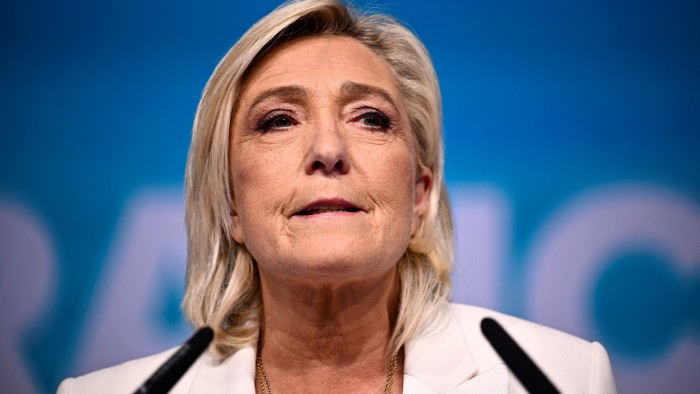Unlock the Editor’s Digest for free
Roula Khalaf, Editor of the FT, selects her favourite stories in this weekly newsletter.
French far-right leader Marine Le Pen has warned that her party will vote to bring down the government led by premier Michel Barnier if its demands to amend his belt-tightening draft budget are not met.
Le Pen criticised both Barnier’s methods of ignoring the opposition in the National Assembly, and the content of the draft budget itself, which would increase the taxes on items such as electricity bills, medicines and doctors’ appointments.
“We will not accept that the purchasing power of the French is amputated even more,” she told RTL radio on Wednesday. “This is a red line, and if it was crossed, then we would vote a no-confidence motion with no problem at all.”
The hardened tone from Le Pen comes after weeks of fruitless, yet noisy debate in the assembly over Barnier’s plans to boost France’s ailing public finances. Opposition parties have voted for hundreds of amendments that will probably be wiped away when Barnier uses a constitutional clause to pass the budget.
The method, known as the 49.3 after an article in the constitution, enables the government to override lawmakers, allowing it rewrite the budget as it pleases. But it then opens it up to a no-confidence vote. If that vote is lost, the budget will be rejected and Barnier’s government will fall, worsening the political instability that has marred France since snap elections in June delivered a hung parliament.
Barnier could trigger the 49.3 from mid-December. Parliamentary debate on the budget must legally end after 70 days on December 21.
Le Pen’s Rassemblement National (National Rally) has particular influence over any no-confidence vote because it has 124 seats, making it the single biggest opposition party, and 16 other allied MPs. If it aligns with the Nouveau Front, the group of leftwing parties which has already said that it will file a no-confidence motion, then such a vote would pass.
Barnier’s draft budget has provoked criticism from across the political spectrum — even from the four parties that are supposed to make up his supporters in parliament. That puts him in a “very fragile position” barely three months after being named premier by President Emmanuel Macron, according to political scientist Bruno Cautrès.
“There is a real risk that Le Pen presses the button,” he said, referring to a no-confidence vote. “It is also a negotiating position with Barnier to force him to take some of their ideas on board, but the RN cannot be seen by their voters to be helping Barnier and getting nothing in return.”
Proposed in September, Barnier’s draft budget includes €60bn worth of spending cuts and tax increases on companies and the wealthy, as France seeks to narrow its widening deficits that have alarmed Brussels and financial markets alike.
Barnier had promised the package would be a mix of two-thirds spending cuts and one-third tax hikes. But one MP from Macron’s party recently predicted that the final package could even end up at 80 per cent tax hikes and 20 per cent cuts, with very few structural reforms.
France is already one of the most highly taxed countries in the OECD, and Barnier’s proposals risk undermining Macron’s business-friendly reforms that have attracted foreign investment to the country since 2017.
Barnier is set to meet Le Pen on Monday as part of the premier’s discussions with opposition parties on the budget.
Other analysts have speculated Le Pen’s trial on charges that she misused EU parliament funds could make her more willing to take the risk of bringing down Barnier. Prosecutors have asked for a five-year suspended sentence and for her to be barred from elected office for five years, which they argued should take effect even before appeals were exhausted.
Such a ruling would force Le Pen out of the 2027 presidential race. Le Pen has said she has committed no wrongdoing.
Le Pen has acknowledged that Barnier would not agree to all her demands. National Rally strongly opposes the government’s plan to increase electricity taxes to raise €3bn, and Le Pen said the party also wants to protect “individuals, entrepreneurs and retirees” from heavier taxes.
Read the full article here




